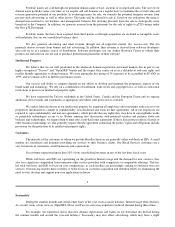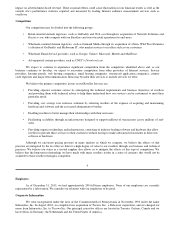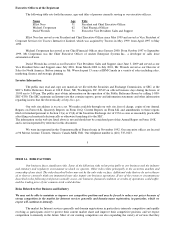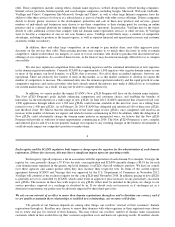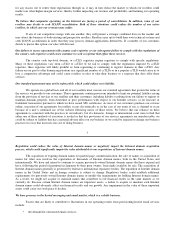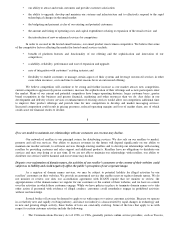Tucows 2013 Annual Report Download - page 16
Download and view the complete annual report
Please find page 16 of the 2013 Tucows annual report below. You can navigate through the pages in the report by either clicking on the pages listed below, or by using the keyword search tool below to find specific information within the annual report.
We may experience unforeseen liabilities in connection with our domain name portfolio, which could negatively impact
our financial results.
We currently own a portfolio of domain names that were previously owned by another third-party. In addition, we
have acquired, and intend to continue to acquire, other previously owned domain names. While we have a policy against
acquiring domain names that infringe on third-party intellectual property rights, including trademarks or confusingly similar
business names, in some cases, these acquired names may have trademark significance that is not readily apparent to us or is
not identified by us in the bulk purchasing process. As a result, we may face demands by third party trademark owners
asserting infringement or dilution of their rights and seeking transfer of the domain names through the Uniform Domain
Name Resolution Policy, or UDRP, adopted by ICANN or actions under the Anticybersquatting Consumer Protection Act, or
ACPA. We may also face actions from third-parties under national trademark or anti-competition legislation.
We review each claim or demand on its merits and we intend to transfer any such previously owned domain names
acquired by us to parties that have demonstrated a valid prior right of claim. We cannot, however, guarantee that we will be
able to resolve all such disputes without litigation. The potential violation of third party intellectual property rights and
potential causes of action under consumer protection laws may subject us to unforeseen liabilities, including injunctions and
judgments for monetary damages.
13
Once any infringement is detected, disputes concerning the ownership or rights to use intellectual property could be costly
and time-consuming to litigate, may distract management from operating the business, and may result in us losing
significant rights and our ability to operate all or a portion of our business.
Claims of infringement of intellectual property or other rights of third parties against us could result in substantial
costs. Third parties may assert claims of infringement of patents or other intellectual property rights against us concerning
past, current or future technologies. Content obtained from third parties and distributed over the Internet by us may result in
liability for defamation, negligence, intellectual property infringement, product or service liability and dissemination of
computer viruses or other disruptive problems. We may also be subject to claims from third parties asserting trademark
infringement, unfair competition and violation of publicity and privacy rights relating specifically to domains. As a domain
name registrar, we regularly become involved in disputes over registration of domain names. Most of these disputes arise as a
result of a third party registering a domain name that is identical or similar to another party’s trademark or the name of a
living person. These disputes are typically resolved through the UDRP, ICANN’s administrative process for domain name
dispute resolution, or less frequently through litigation under the ACPA, or under general theories of trademark infringement
or dilution. The UDRP generally does not impose liability on registrars, and the ACPA provides that registrars may not be
held liable for registering or maintaining a domain name absent a showing of bad faith intent to profit or reckless disregard of
a court order by the registrars. However, we may face liability if we fail to comply in a timely manner with procedural
requirements under these rules. In addition, these processes typically require at least limited involvement by us, and therefore
increase our cost of doing business. The volume of domain name registration disputes may increase in the future as the
overall number of registered domain names increases.
These claims and any related litigation could result in significant costs of defense, liability for damages and
diversion of management’s time and attention. Any claims from third parties may also result in limitations on our ability to
use the intellectual property subject to these claims unless we are able to enter into agreements with the third parties making
these claims. If a successful claim of infringement is brought against us and we fail to develop non-infringing technology or
to license the infringed or similar technology on a timely basis, we may have to limit or discontinue the business operations
which used the infringing technology.
We rely on technologies licensed from other parties. These third-party technology licenses may infringe on the
proprietary rights of others and may not continue to be available on commercially reasonable terms, if at all. The loss of this
technology could require us to obtain substitute technology of lower quality or performance standards or at greater cost,
which could increase our costs and make our products and services less attractive to customers.
The law relating to the liability of online services companies for data and content carried on or disseminated through
their networks is currently unsettled and could expose us to unforeseen liabilities.
It is possible that claims could be made against online services companies under U.S., Canadian or foreign law for
defamation, negligence, copyright or trademark infringement, or other theories based on data or content disseminated through
their networks, even if a user independently originated this data or content. Several private lawsuits seeking to impose
liability upon Internet service companies have been filed in U.S. and foreign courts. While the United States has passed laws
protecting ISPs from liability for actions by independent users in limited circumstances, this protection may not apply in any


